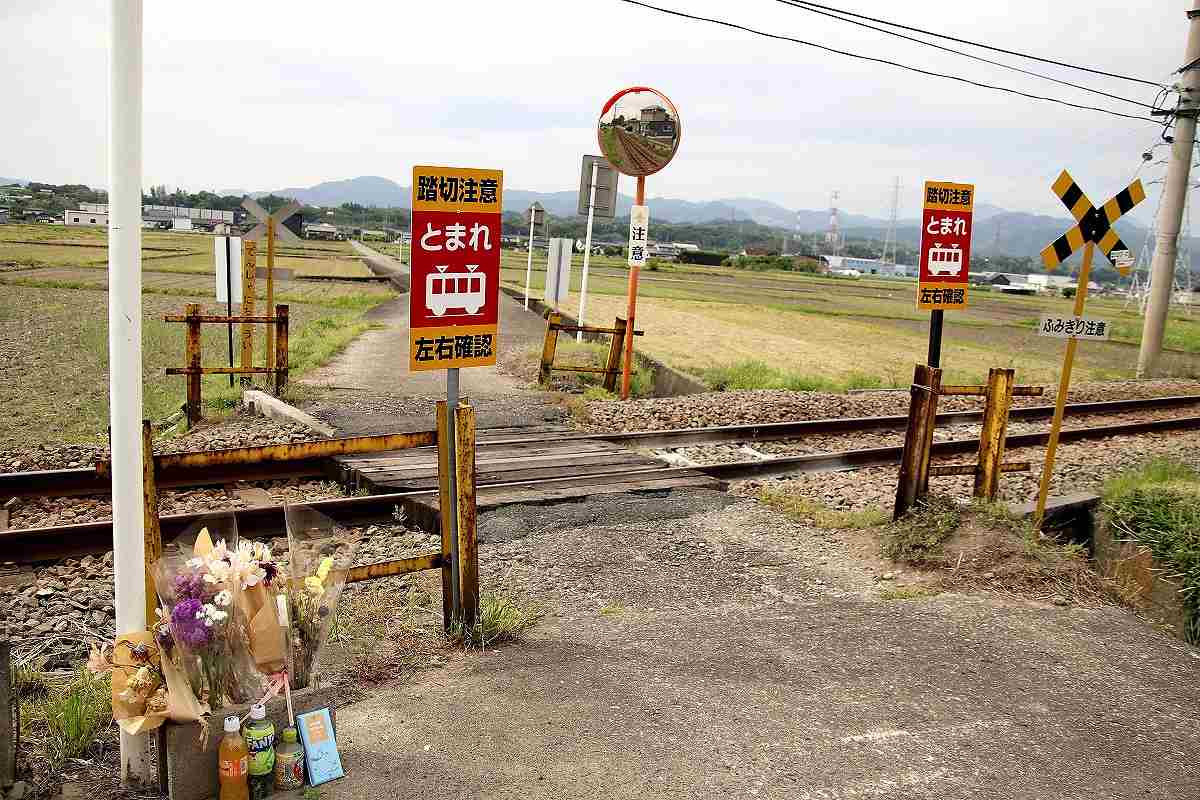
Flowers are offered at a railroad crossing in Takasaki, Gunma Prefecture, on May 6, a month after the fatal accident at the crossing.
13:20 JST, June 1, 2024
MAEBASHI — A recent accident in which a 9-year-old girl was struck and killed by a train at a railroad crossing in Takasaki, Gunma Prefecture, calls attention to the many similar accidents that have occurred across the country and emphasizes the need for safer crossings.
In response to the accident, local governments in the prefecture have set a goal of replacing such crossings, categorized as “Class 4,” with safer “Class 1” crossings, which have alarms and crossings gates.
On the morning of April 6, Kirara Shibusawa, a fourth-grade elementary school student, was fatally struck by a train at a Class 4 crossing of the Joshin Electric Railway line that had no alarm or crossing gate. Her father, Satoshi Shibusawa, 44, said, “I hope that proper safety measures will be taken nationwide so that such a tragic accident will never happen again.”
A walk turns tragic
On a Saturday before the start of the new school year, Kirara left the house with two relatives to walk their pet dog. Soon afterward, Shibusawa, who was on the second floor, heard a hard thud. He looked out the window and saw one of the relatives shouting, “Kirara has been hit by the train!”
Shibusawa rushed out of the house and toward the train, which had made an emergency stop. He saw his daughter lying limp on the tracks about 20 meters from the crossing.
“Please spare my daughter,” he prayed desperately. However, his mind went blank when he overheard the emergency crew who had arrived on the scene say, “No need for rescue operations” over a wireless communication system. He later learned that his daughter had entered the crossing while chasing after the dog, which was on the other side of the tracks.
Kirara, his younger daughter, loved to dress up and never failed to apply makeup when she went out. On family members’ birthdays, she sang the birthday song while playing the electronic keyboard. During a family trip to Kyoto this past spring break, she enjoyed eating candied strawberries and smiled for photos at Fushimi Inari Taisha shrine. It seemed like she was greatly looking forward to the start of the new school year.
“I’m going to be in the same class as my best friend,” she told her family.
“The sunshine of our family is gone forever,” Shibusawa said. He has not been able to put away her school backpack and clothes that had been left in the living room. His elder daughter, a high school student, has become unable to take the train she usually rode to school. She sleeps in the living room, where a memorial portrait of her younger sister is placed, as she wants to “be with Kirara.”
In response to the accident, the Takasaki municipal government announced that it would abolish all Class 4 railroad crossings at 21 locations in the city. The city will subsidize the cost of converting the crossings to Class 1 with alarms and crossing gates from fiscal 2025 on behalf of Joshin Electric Railway, which is facing financial difficulties.
There are currently 74 Class 4 crossings in Gunma Prefecture. In addition to Takasaki, fatal accidents have also occurred at Class 4 crossings in Tomioka and Midori. The prefectural government has announced a goal to abolish all Class 4 crossings by the end of fiscal 2029 and is surveying municipalities about their intentions.
The railway crossing where Kirara was killed was already scheduled to be upgraded to a Class 1 crossing in fiscal 2025.
“A child was killed. This is a serious matter,” Takasaki Mayor Kenji Tomioka said on May 2. “We will take the necessary measures as soon as possible, as this situation may endanger the life of our citizens,” he continued, stressing the importance of taking quick action.
“If only the railroad operator and the local government had acted earlier,” Shibusawa said in frustration. He hopes that dangerous railroad crossings will be eliminated. “I can’t turn the clock back [to before the accident]. At the least, I hope other people will not have to go through what I have.”
Hajime Tozaki, a professor of transportation policy at J. F. Oberlin University in Tokyo, said: “It is difficult for railroad operators and residents to solve the problem by themselves. It is important for local governments to get involved and act from a neutral position.”
Top Articles in Society
-

Producer Behind Pop Group XG Arrested for Cocaine Possession
-

Man Infected with Measles Reportedly Dined at Restaurant in Tokyo Station
-

Man Infected with Measles May Have Come in Contact with Many People in Tokyo, Went to Store, Restaurant Around When Symptoms Emerged
-

Woman with Measles Visited Hospital in Tokyo Multiple Times Before Being Diagnosed with Disease
-

Australian Woman Dies After Mishap on Ski Lift in Nagano Prefecture
JN ACCESS RANKING
-

Producer Behind Pop Group XG Arrested for Cocaine Possession
-

Japan PM Takaichi’s Cabinet Resigns en Masse
-

Man Infected with Measles Reportedly Dined at Restaurant in Tokyo Station
-

Israeli Ambassador to Japan Speaks about Japan’s Role in the Reconstruction of Gaza
-

Videos Plagiarized, Reposted with False Subtitles Claiming ‘Ryukyu Belongs to China’; Anti-China False Information Also Posted in Japan



















